On March 15th-17th, 2024, an electoral event took place in Russia, which the current regime tried to present to the Russian people and the global community as "elections." In reality, we witnessed just another criminal act by the Putin’s regime, which we qualify as a usurpation of power.
Tag: Accepted
Resolution of the Congress of People’s Deputies on relations between the Russian Republic and the peoples of the Caucasus
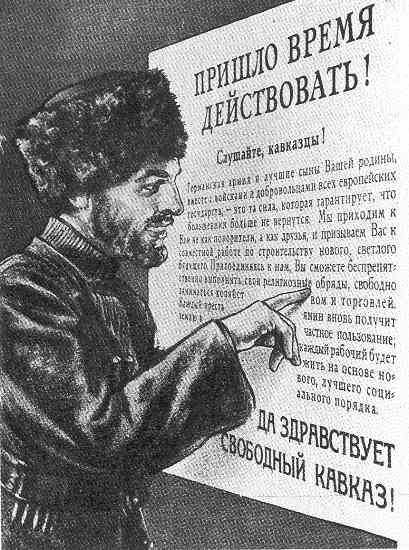
On 26 November 2023, at the plenary session of the fourth session of the Congress of People's Deputies, the Congress considered and adopted a resolution "On the relations of the Russian Republic with the peoples of the Caucasus"
The Constitution of the Russian Republic. Chapter 2
CHAPTER 2. RIGHTS AND FREEDOMS OF HUMAN BEINGS AND CITIZENS
(more…)Regulation on the Ethics Commission of the Congress of People’s Deputies
Act “On Urgent Measures for the Rehabilitation of Russian Germans”
-
Revoke the effect of the Decree of the President of the Russian Federation V. Putin dated January 31, 2016, No. 34.
- Restore the effect of the Decree of the President of the Russian Federation B. Yeltsin dated February 21, 1992, No. 231 in its entirety.
- In order to implement the Decree of the President of the Russian Federation B. Yeltsin dated February 21, 1992, No. 231, develop an Act on the restoration of statehood for Russian Germans within the borders of the Autonomous Soviet Socialist Republic of Volga Germans as of August 28, 1941.
The concept of conducting by-elections for the composition of the Congress of People’s Deputies
By-elections (co-optation) for the composition of the Congress of People's Deputies are conducted online.
In these elections, any citizen of the Russian Federation who has undergone identification by the electoral commission can participate as a voter. Participation in the elections implies the voter's agreement with the Founding Declaration of the Congress and the Act of Resistance Movement.
Resolution on Relations with Russia’s European Neighbours
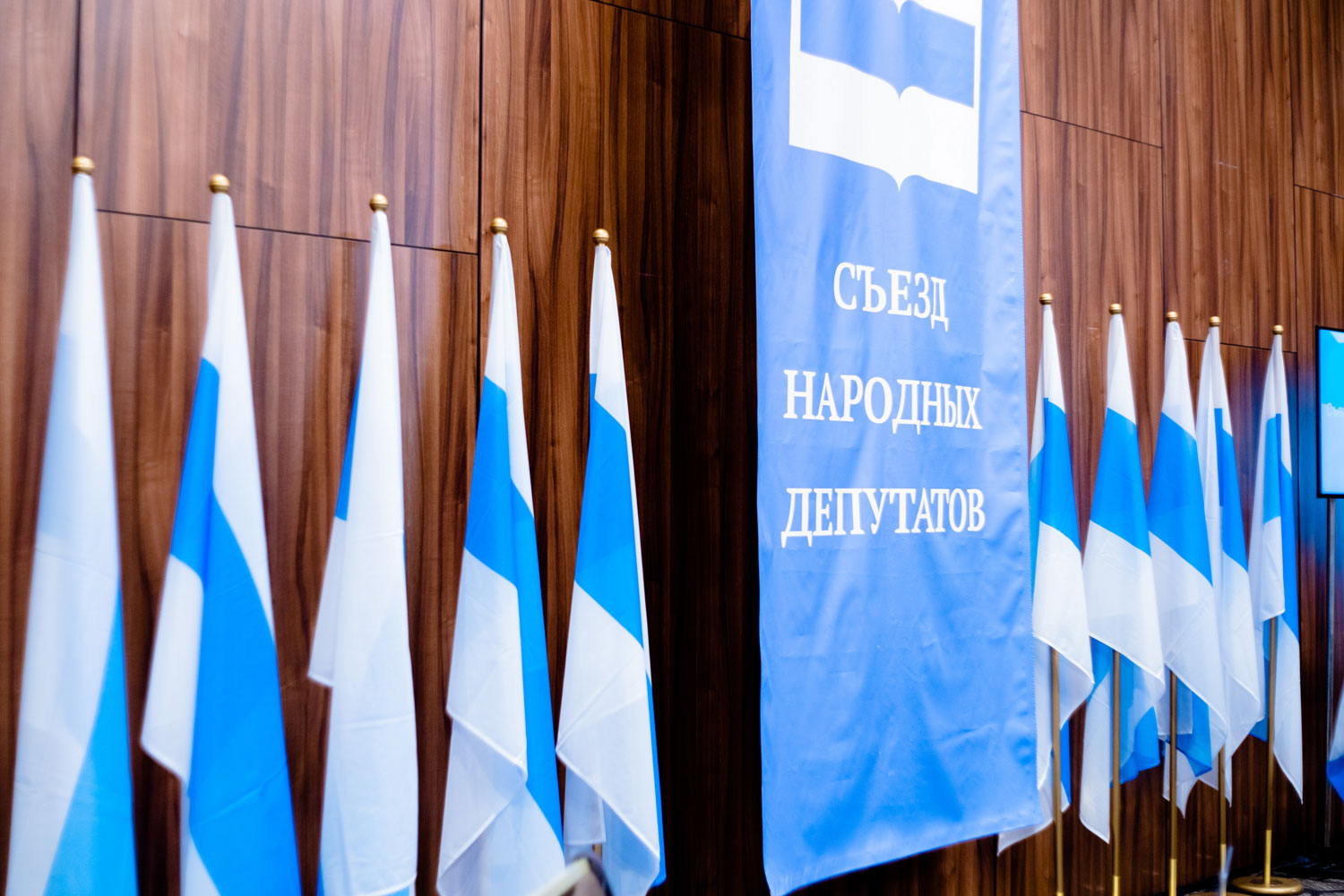
The history of Russia is full of tragic episodes in terms of relations with its neighbours. Belarus, Hungary, Latvia, Lithuania, Moldova, Poland, Romania, Slovakia, Ukraine, Finland, the Czech Republic, and Estonia have repeatedly faced Russia's imperial policies. Putin’s regime has continued this "tradition". Russian society cannot become free and fair, cannot create conditions for a safe and lasting peace without acknowledging mistakes and crimes committed in the past and present, and without repenting for them.
Resolution of the Congress of People’s Deputies on cooperation with the democratic forces of the Russian opposition
Having considered the information of the Executive Council on the participation of representatives of the Congress of People's Deputies in meetings of democratic forces in Berlin on April 29-30, 2023, and in the European Parliament on June 5-6, 2023,
(more…)Act of Release and Rehabilitation
During the years of Putin's regime, tens of thousands of people have become victims of the police state, subjected to repression for their political beliefs, on ideological, social, national, religious and other grounds. The law, the judicial system, law enforcement agencies and the penitentiary system in the Russian Federation have become a punitive tool in the hands of the ruling elite to persecute and intimidate all those who disagree with its policies, as well as an instrument of control and suppression of society.
(more…)Act on Lustration
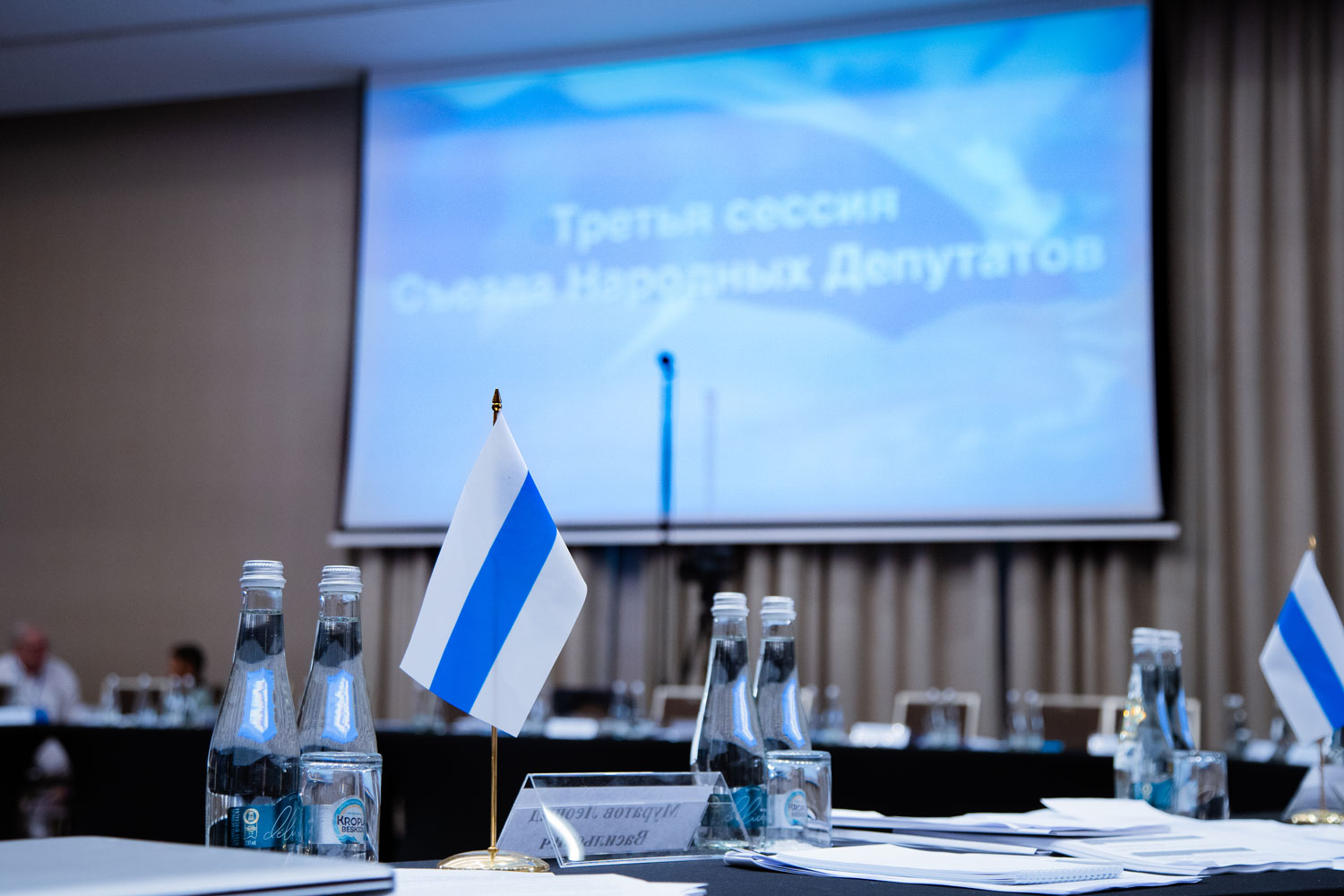
Lustration is the deprivation of civil rights of individuals holding state and municipal positions, managerial positions in state corporations and other government institutions, organizations, members of the State Duma and the Federation Council of the Federal Assembly of the Russian Federation, members of the legislative bodies of the subjects of the Russian Federation, and other individuals who have violated:
- The Constitution of the Russian Federation, adopted in 1993;
- The European Convention on Human Rights (ECHR);
- Resolution PACE 1996 (No. 1481 of 2006, originally No. 1096 of 1996) "On measures to eliminate the legacy of former communist totalitarian systems";
- The Universal Declaration of Human Rights,
who are guilty of usurping power and violating the civil rights and freedoms of citizens and peoples of Russia, supporting aggressive wars against other countries, and failing to show genuine remorse as of the date of the Lustration Commission's establishment
The Congress of People's Deputies hereby adopts this Act with the aim of restoring justice, promoting civil reconciliation, reviving respect for human rights and fundamental freedoms, creating legal conditions for the transition from an authoritarian regime to a democratic state, restoring trust in state institutions, and eliminating the negative consequences in the political and social life of the Russian Republic. This Act establishes prohibitions on the following activities for individuals subject to lustration:
- Exercising elected parliamentary powers at all levels;
- Exercising official and authoritative powers in the organs of state power and local self-government;
- Holding positions in the management bodies of state-owned companies;
- Holding positions in the management bodies of companies supplying goods and services to the organs of state and municipal authorities, as well as state-owned companies;
- The implementation of teaching activities in secondary and higher educational institutions in the field of humanities and social sciences
- Establishment, financing, and management of media outlets, journalistic activities, publication placement, and public appearances in the media
- Service in the armed forces, law enforcement agencies, and public and state security agencies, work in judicial bodies;
- Engaging in activities related to the production, financing, and distribution of audiovisual, music, and film products, as well as organizing entertainment and mass events;
- Other prohibitions provided for in the Constitution of the Russian Republic for individuals subject to lustration restrictions.
These prohibitions are necessary to prevent the legislative entrenchment and promotion of ideas related to the superiority of certain nations and cultures, the denigration of other peoples, the violation of the territorial integrity of states and/or their state structure, and to exclude the restoration of an authoritarian/totalitarian regime in the Russian Republic
MAIN PART
- The grounds for bringing to justice (impeachment) include:
- Development, adoption, public support, and implementation of Federal Constitutional Laws of the Russian Federation, federal laws, Decrees of the President of the Russian Federation, regulatory legal acts, resolutions adopted by deputies of the State Duma and members of the Federation Council of the Federal Assembly of the Russian Federation, as well as the adoption and implementation of resolutions, decisions of the Government of the Russian Federation, ministries, services, departments, laws, and other normative legal acts of the constituent entities of the federation aimed at usurping state power, inciting interethnic enmity, unleashing aggressive wars, violating the territorial integrity and sovereignty of foreign states, committing war crimes and crimes against humanity.
Such documents include:
- Federal Law of the Russian Federation on the amendment to the Constitution of the Russian Federation dated March 14, 2020, No. 1-FKZ "On Improving the Regulation of Certain Issues of the Organization and Functioning of Public Power."
- Federal Constitutional Law dated March 21, 2014, No. 6 (as amended on July 14, 2022) "On the Adoption of the Republic of Crimea into the Russian Federation and the Formation of New Subjects within the Russian Federation - the Republic of Crimea and the city of federal significance Sevastopol."
- Federal Constitutional Law dated October 4, 2022, No. 5-FKZ "On the Adoption of the Donetsk People's Republic into the Russian Federation and the Formation of a New Subject within the Russian Federation - the Donetsk People's Republic."
- Federal Constitutional Law dated October 4, 2022, No. 6-FKZ "On the Adoption of the Luhansk People's Republic into the Russian Federation and the Formation of a New Subject within the Russian Federation - the Luhansk People's Republic."
- Federal Constitutional Law of October 4, 2022, No. 7-FKZ "On the Admission of the Zaporizhzhia Oblast into the Russian Federation and the Formation of a New Subject within the Russian Federation - the Zaporizhzhia Oblast".
- Federal Constitutional Law of October 4, 2022, No. 8-FKZ "On the Admission of the Kherson Oblast into the Russian Federation and the Formation of a New Subject within the Russian Federation - the Kherson Oblast".
- Resolution of the Federation Council of the Federal Assembly of February 22, 2022, No. 35-SF "On the Use of the Armed Forces of the Russian Federation outside the Territory of the Russian Federation".
- Federal Law of July 14, 2022, No. 255-FZ "On Control over the Activities of Persons under Foreign Influence".
- Federal Law of March 4, 2022, No. 32-FZ "On Amending the Criminal Code of the Russian Federation and Articles 31 and 151 of the Criminal Procedure Code of the Russian Federation" (introducing Articles 207.3, 280.3, 284.2 of the Criminal Code of the Russian Federation).
- Federal Law of March 4, 2022, No. 31-FZ (as amended on July 14, 2022) "On Amending the Code of the Russian Federation on Administrative Offenses" (introducing Articles 20.3.3 and 20.3.4).
- Federal Law of July 25, 2002, No. 114-FZ "On Countering Extremist Activities".
- Federal Law of December 28, 2012, No. 272-FZ "On Measures to Influence Individuals Involved in Violations of Fundamental Human Rights and Freedoms, Rights and Freedoms of Russian Federation Citizens"
- Decree of the President of the Russian Federation dated September 21, 2022, No. 647 "On the declaration of partial mobilization in the Russian Federation", in accordance with Federal Laws dated May 31, 1996, No. 61-FZ "On Defense", dated February 26, 1997, No. 31-FZ "On Mobilization Training and Mobilization in the Russian Federation", and dated March 28, 1998, No. 53-FZ "On Military Duty and Military Service"
- Categories of persons subject to mandatory lustration
1) Individuals who have participated in the development, approval, public support, and implementation of the aforementioned federal laws, federal constitutional laws, Decrees of the President of the Russian Federation, and other regulatory legal acts aimed at inciting national hatred, aggression, suppressing constitutional rights and freedoms of individuals in Russia, annexation of territories of sovereign states, including the Republic of Crimea and the city of Sevastopol, conducting special operations in Ukraine, recognizing the independence of the Donetsk People's Republic (DPR) and Luhansk People's Republic (LPR), as well as the adoption and implementation of the four Federal Constitutional Laws dated October 5, 2022, "On the inclusion of the Donetsk People's Republic, Luhansk People's Republic, Zaporizhia, and Kherson regions into the Russian Federation".
2) Judges, prosecutors, investigators who have made decisions to bring individuals to administrative and/or criminal liability for expressing anti-war positions and/or condemning and criticizing the actions of the armed forces of the Russian Federation, as provided for by the following articles:
- Articles 128.1, 148, 207.3, 212, 212.1, 274.1, 275.1, 280, 280.1-280.4, 282, 282.1-282.4, 284.1, 284.2, 330.1, 330.2, parts 2.1, 2.2 of Article 332, part 3 of Article 333, part 3 of Article 334, parts 2.1, 3.1, 5 of Article 337, part 3 of Article 338, part 3 of Article 339, parts 4, 5 of Article 340, parts 4, 5 of Article 341, parts 4, 5 of Article 342, part 3 of Article 344, part 3 of Article 346, Article 347 (as amended by Federal Law dated September 24, 2022, No. 365-FZ), Article 348 (as amended by Federal Law dated September 24, 2022, No. 365-FZ), and Article 352.1 of the Criminal Code of the Russian Federation.
- Articles 13.41, 13.42, 13.46, 13.48, 19.7.5-2, 19.7.5-4, 19.7.10.1-19.7.10.3, 19.25, 20.2, 20.2.2, 20.2.3, 20.3, 20.3.1-20.3.4, 20.28, 20.29, 20.33 of the Code of the Russian Federation on Administrative Offenses.
- employees of operational units of the Ministry of Internal Affairs of the Russian Federation, the Federal Security Service of the Russian Federation, the Federal Protective Service of the Russian Federation, and the Federal Penitentiary Service of the Russian Federation, engaged in operational-search activities related to the specified category and involving external staff;
- 3) authorized individuals and individuals conducting pre-election campaigning in the presidential campaigns of the Russian Federation's President Vladimir Putin from 2012 to 2023;
- 4) Individuals responsible for editorial and information policies, heads of newspapers, magazines, television programs, internet media, TV and radio shows, leading TV and radio programs, who supported and approved the actions of the President of the Russian Federation and the Government of the Russian Federation regarding the annexation of Ukrainian territory, partial mobilization, and amendments to the Constitution of the Russian Federation;
- 5) Citizens of the Russian Federation who propagated a special military operation in Ukraine.
- 6) Citizens of the Russian Federation who have been subject to international sanctions from 2012 until the effective date of this Act. Citizens of the Russian Federation who were under sanctions and had the sanctions lifted by at least one of the following countries: Ukraine, USA, UK, are excluded from the list of individuals subject to lustration.
- 7) Heads, deputy heads, officials of state authorities who held senior and key positions from 07.05.2012 according to the List (Appendix No. 1).
- 8) Other individuals not included in the aforementioned categories but who are considered (equivalent to) heads, deputy heads, officials holding senior and key positions in state authorities.
- Term of bringing individuals to verification and deprivation of rights (lustration)
Within ten years from the date of entry into force of this Act, individuals listed in Article 2, paragraphs 1-8, who have not carried out, within three months from the date of Lustration, the public condemnation of a special military operation and the transfer of a significant part of their personal assets to support political organizations fighting against the Putin regime or the Armed Forces of Ukraine or the "United24" fund or other organizations authorized by the Congress of People's Deputies, shall be prohibited from engaging in the types of activities listed in the preamble of this Act. Additionally, they shall be deprived of passive voting rights and shall not be eligible for election to the Parliament of the Russian Republic, legislative bodies of the Russian Republic's subjects, or hold elective positions in state corporations.
The prohibition on holding leading state, regional, and municipal positions in the aforementioned authorities may only be applied to an individual once.
-
- Establishment of the Commission for the Verification of Individuals Subject to Lustration
The Congress of People's Deputies establishes a Lustration Commission consisting of twenty-one members, with the possibility of subsequent rotation as decided by the Congress of People's Deputies.
- The Lustration Commission operates during the transitional period, until the election of a new parliament and the formation of the Government of Russia.
- Information about the formation of the Commission is published in the media, press, on the Internet, and on the official website of the Lustration Commission.
- The Lustration Commission conducts its activities in accordance with the Regulations developed and approved by the Congress of People's Deputies.
- In order to directly implement this Lustration Act and provide technical support for the work of the Lustration Commission, an Office is established, the staff of which is approved by the Commission. The Office of the Commission operates based on the Regulations on the Office of the Lustration Commission approved by the Commission.
- General Procedure and Responsibilities of the Commission
- The Lustration Commission compiles, publishes, and maintains an official Registry, into which citizens are entered in accordance with the "Categories of persons subject to mandatory lustration."
- Citizens, representatives of the public, and the media have the right to approach the Lustration Commission with a request for an investigation of individuals who have sufficient grounds for inclusion in the Registry.
- Individuals subject to lustration have the right, within one month after the publication of the Registry, to contact the Lustration Commission to provide information about their non-involvement in the violation of rights and freedoms of citizens, special military operations, and other acts of international aggression by Russia.
- The Lustration Commission has the right to request and obtain information about income, ownership of property, from tax and registration authorities in order to verify the accuracy of the information provided regarding a person's non-involvement in the violation of rights and freedoms of citizens, special military operations, and other acts of international aggression by Russia.
- The verification process should not exceed 30 days.
- Information about the verification process is public, and the results of the verification are reflected in a special Registry of individuals subject to verification.
- The Lustration Commission is obligated to individually consider the applications and materials submitted regarding individuals subject to lustration.
- The Commission on Lustration, based on the results of the verification, issues one of the following motivated decisions:
- - Exclusion from the list;
- - The need for additional verification;
- - Prohibition to engage in activities listed in the preamble of this Act for a period of up to 10 years;
- - Referring to law enforcement agencies with a statement to investigate the actions or inaction of individuals who have committed criminal offenses (military, corruption, etc.);
- - Referring the Commission to the judicial authorities with a statement to deprive individuals of property rights, funds that are not confirmed by the Income Declaration, in relation to those who initiated, adopted, and enforced unconstitutional laws.
- The motivated decision is made by the Commission with a qualified majority, not less than two-thirds of the votes of the elected members of the Commission, and is signed by the Chairman and the Secretary of the Commission
- The person who has undergone the verification has the right to challenge the results of the verification and the decision of the Lustration Commission in court within one month after receiving the motivated decision of the Commission.
- The registry of individuals subject to lustration shall be officially published in the mass media and on the official website of the Parliament.
- The Parliament is responsible for monitoring the actions and decisions of the Lustration Commission.
6. According to this Act, both administrative and criminal liabilities are established for non-compliance or evasion of lustration.
- Administrative liability is outlined in the Administrative Offenses Code, which is supplemented with the following article:
"Engaging in activities prohibited by the Lustration Act by a citizen included in the lustration registry shall result in the imposition of an administrative fine of up to 50,000 times the minimum hourly wage or administrative arrest for a period of up to 30 days."
2. In addition, criminal liability is established under the Criminal Code, which is supplemented with the following article:
"1) Providing knowingly false information to the lustration commission or concealing information that affects the inclusion of a citizen in the lustration registry shall be punished by imprisonment for a term of 3 to 5 years, violation of the restrictions imposed on individuals included in the lustration register, when entering into employment or economic relations with them, is punishable by a fine of up to 100,000 times the minimum hourly wage or by community service for a period of up to three years.
2) Repeat commission of activities prohibited by the Lustration Act by a citizen included in the lustration register is punishable by imprisonment for a term of 5 to 10 years with confiscation of property.
3) Failure of a citizen or organization to comply with the restrictions imposed on individuals included in the lustration register when entering into employment or economic relations with them is punishable by a fine of up to 30,000 times the minimum hourly wage for individuals and up to 100,000 times the minimum hourly wage for organizations, with the inclusion of the violator, who is a citizen and/or a representative of the organization, in the lustration register as outlined in the Lustration Act.
4) Violation by officials of the electoral commissions and government authorities of the requirements of the Lustration Act during electoral campaigns and referendums is punishable by imprisonment for a term of three to five years, with the inclusion of the individuals who have violated the requirements of the Lustration Act in the lustration register."
- Entry into force of the Lustration Act
1) The Lustration Act shall be officially published in the mass media and on the official website of the Congress of People's Deputies.
2) The Lustration Act enters into force upon the entry into force of the Transitional Period Act, approved by the Congress of People's Deputies.
Attachments:
List of organizations, government bodies, leaders, deputy leaders, and officials who occupied higher and senior positions between May 7, 2012, and are subject to mandatory lustration:
1) Administration of the President of the Russian Federation,
2) Presidential Executive Office,
3) Central Election Commission;
4) State Duma, Federation Council of the Federal Assembly of the Russian Federation,
5) Apparatus of the State Duma and Federation Council of the Federal Assembly of the Russian Federation;
6) Government of the Russian Federation;
7) Ministries, services, agencies, and departments that are part of the executive branch of the Russian Federation
8) Central Bank of the Russian Federation
9) Treasury of the Russian Federation
10) FSB, Investigative Committee of the Russian Federation, Prosecutor's Office of the Russian Federation, Main Directorate for Countering Extremism of the Ministry of Internal Affairs of Russia, Main Investigative Directorate of the Ministry of Internal Affairs of the Russian Federation
11) National Guard, Federal Penitentiary Service;
12) Legislative bodies of the constituent entities of the Russian Federation.
Constitution of the Russian Republic. Chapter I
Declaration of Rights and Freedoms of a Citizen of the Russian Republic
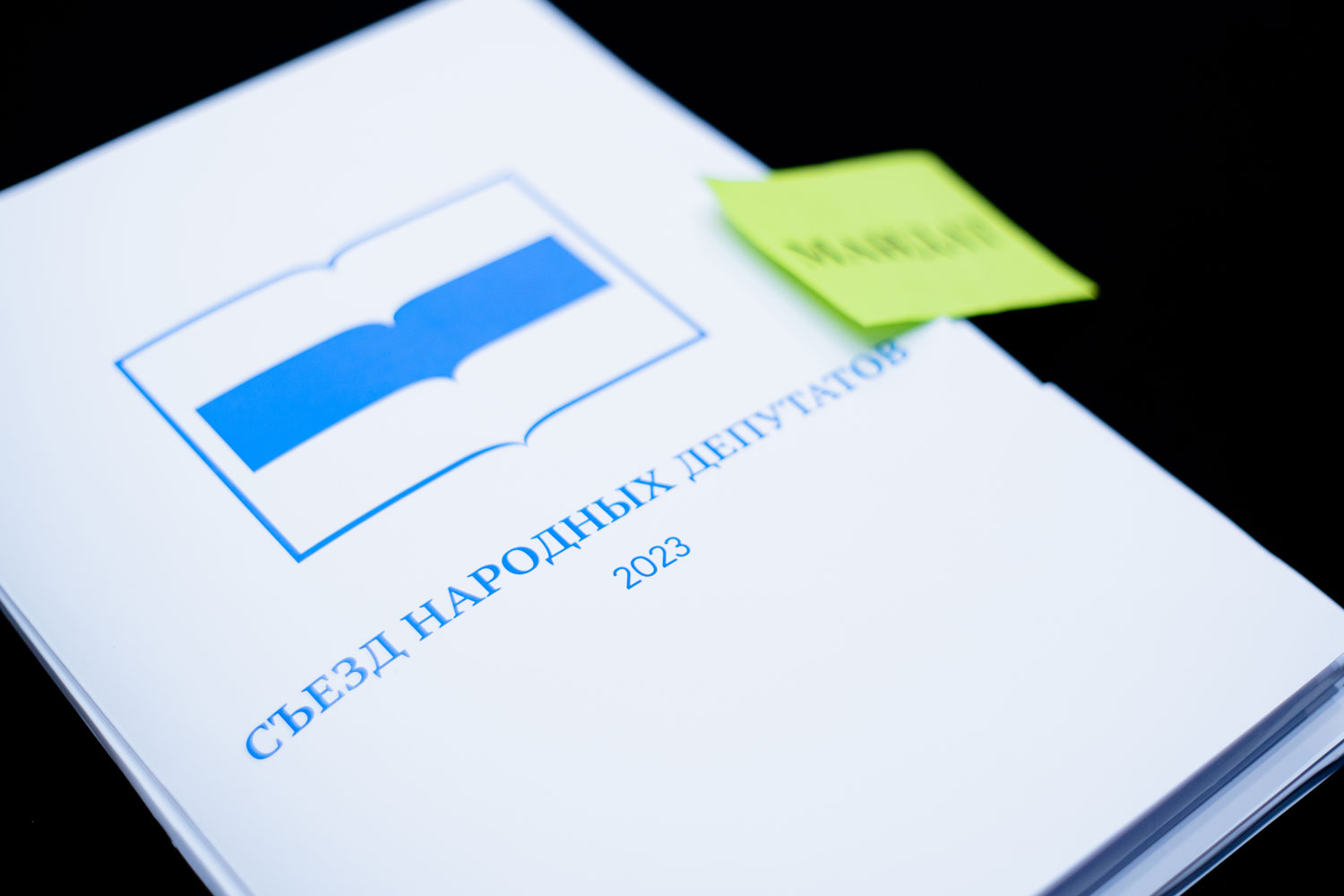
This Declaration is intended to provide all citizens with the conditions for prosperity and the building of a just state and proclaims the principles on which the Constitution and Laws of the Russian Republic are built.
Peace Act
We, the Congress of National Deputies of Russia,
Based on the Founding Declaration of the Congress of National Deputies,
Rejecting aggressive wars, all forms of chauvinism and imperialist discrimination,
Mourning the lives lost in armed conflicts initiated by the Russian leadership,
Establish the following:
(more…)Appeal to the Citizens of Ukraine
Appeal of the Congress of People’s Deputies to the Verkhovna Rada and the Government of Ukraine
Dear Colleagues!
Today, when Europe and the whole world are experiencing a critical moment in their history,
When inside Russia the last sprouts of legal political activity have been destroyed, the country's leadership has lost all signs of legitimacy and usurped power,
When all prominent members of the opposition are either in prison or forced into exile,
When the Russian Federation under the leadership of Vladimir Putin has become a center of armed aggression against neighboring nations and a source of danger to the entire world,
We, legitimately elected Russian deputies who received our mandates in the pre-war years from Russian citizens in internationally recognized elections, have united to work within the Congress of People's Deputies.
(more…)An Act of Resistanse Movement
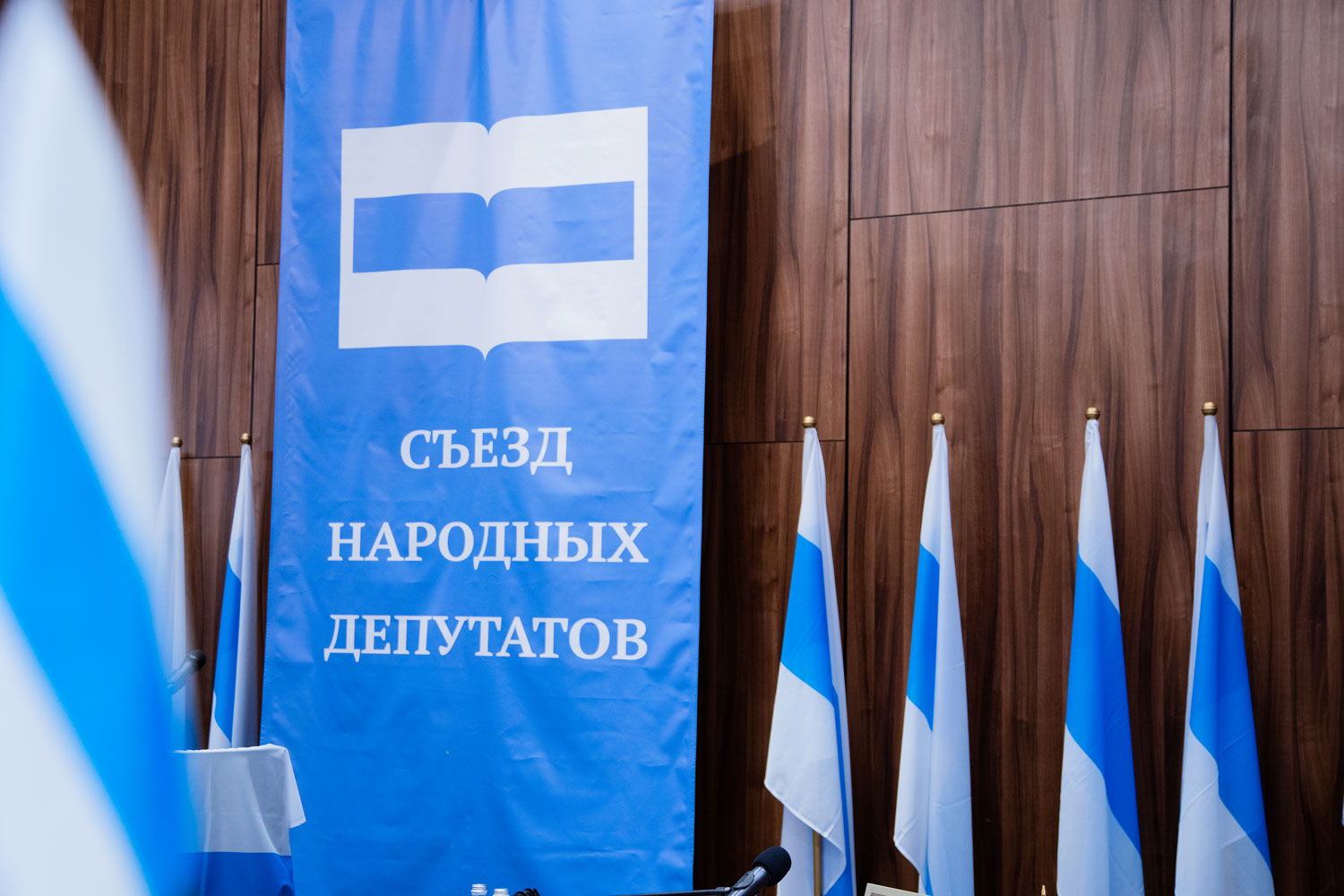
We, the Congress of People's Deputies, considers that political power in Russia has been appropriated and seized by Putin's regime, which is a violation of the foundations of the Russian constitutional order (Part 4, Article 3 of the Russian Constitution) and is recognized as a crime (Article 278 of the Russian Criminal Code).
(more…)The Fundamental Declaration of the congress of people’s deputies
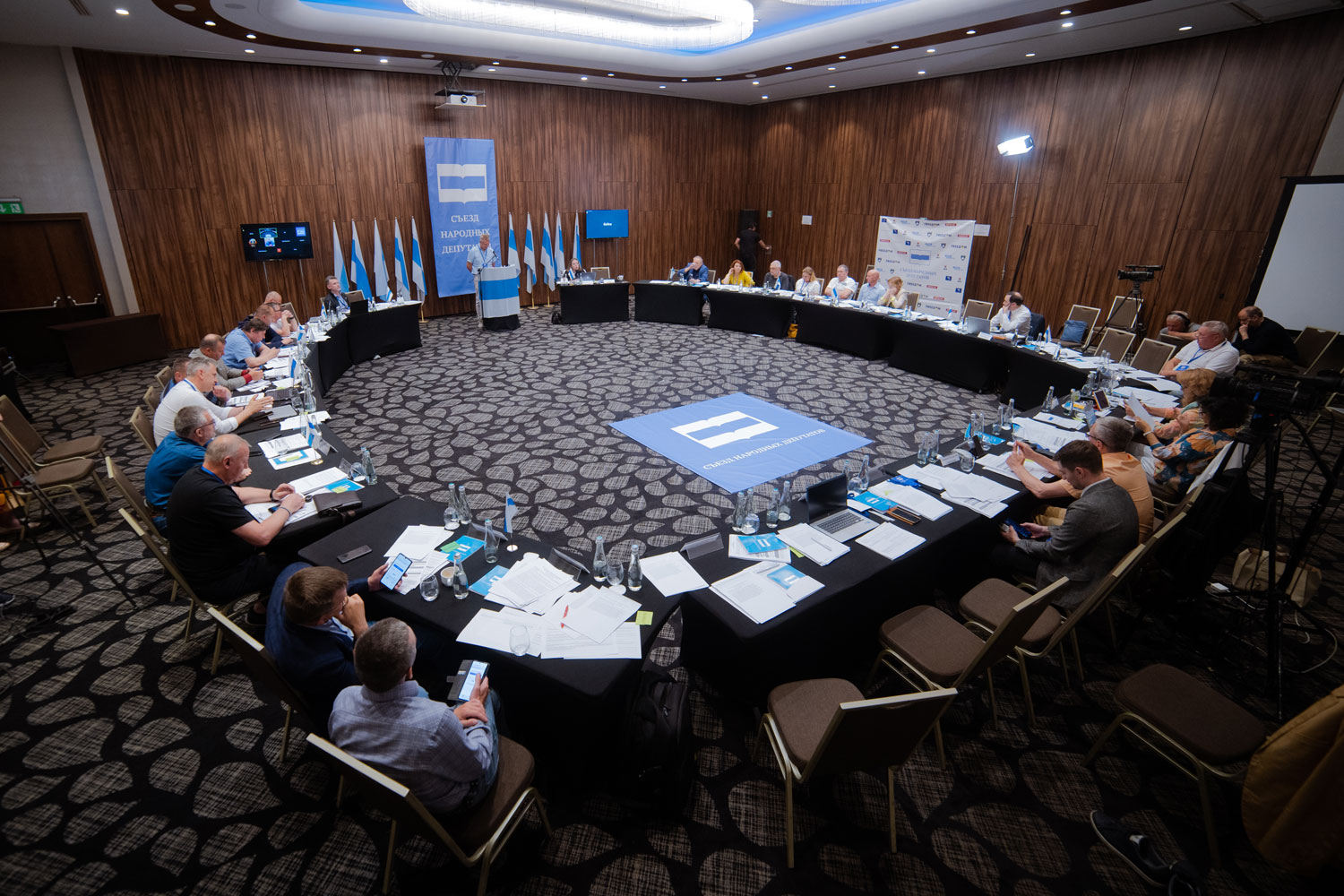
We, the legally elected representatives of the citizens of Russia, endowed by the people with legislative powers, have gathered at our Congress under the present extraordinary circumstances,
Aspiring to the preservation of the lives and prosperity of our fellow citizens,
Considering it immoral to continue inaction and passively wait for change,
Rejecting the regime of the usurper Putin,
Condemning the wars of aggression and injustice,
Considering democracy to be the only acceptable way to govern Russia,
Expressing our willingness to re-create the Russian state,
WE DECLARE:
(more…)